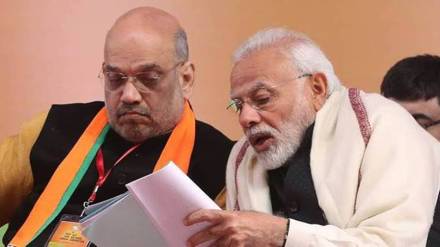The Government of National Capital Territory of Delhi (Amendment) Bill, 2023, has cleared the Lok Sabha test and now heads to the Rajya Sabha where it is set to face its real test of numbers. On Thursday, the Bill brought the Lower House back to order, though temporarily, as MPs discussed the proposed law that seeks to replace the Centre’s ordinance on control of services in Delhi.
The Bill was eventually passed by a voice vote after deliberations that saw the Treasury and Opposition benches indulge in a thorough debate on the pros and cons of the law being pushed by the government.
Also Read: ‘No single valid argument in Lok Sabha to support Bill’: Arvind Kejriwal takes on Amit Shah
The BJP has 301 sitting MPs in the Lok Sabha on its own while the NDA cumulatively commands 331 MPs in the 543-member House. These numbers include the 13 Shiv Sena MPs of the Eknath Shinde faction, one from the Ajit Pawar faction of the NCP, 6 MPs from the Pashupati Kumar Paras (5) and Chirag Paswan (1) factions of the LJP, 2 MPs from Apna Dal (sonelal) and 1 seat each from the NPP, NDPP, AJSU, SKM, MNF, NPP and three Independents.
While the number the NDA commands is comfortably above the majority mark of 272, it received an additional boost as the Biju Janata Dal and the YSR Congress Party, with 12 and 22 MPs in the Lok Sabha, respectively, also vowing support to the Centre’s Bill. Their support takes the tally of those in support of the Bill to a staggering 365.
Also Read: BJD to back Centre on Delhi ordinance Bill, issues three-line whip to MPs
While the BJP-led NDA commands a brute majority in the Lok Sabha, it does not have the requisite numbers in the Rajya Sabha. Yet, it appears to be in a comfortable position in the Upper House despite lacking a majority.
The BJP has 92 Rajya Sabha MPs while the NDA commands 105 seats in the 237-member House. The strength of the Opposition INDIA bloc, which faces a litmus test as it seeks to defeat the Bill in the Rajya Sabha, stands at 99 and may reach 106 if the Bharat Rashtra Samiti of K Chandrashekar Rao decides to side with the Opposition with its 7 MPs. The tally required to reach the halfway mark for either side is 119.
Also Read: Nehru, Ambedkar were against full statehood to Delhi: Amit Shah in Lok Sabha
The Centre, on the other hand, is likely to receive the support of 18 MPs each from the BJD (9) and YSRCP (9), besides the Telugu Desam Party (1) which is also believed to be mulling support for the Centre on the Bill. That would take the NDA’s tally to 124. Additionally, the BJP will likely receive support from five nominated MPs — Gulam Ali, Mahesh Jethmalani, Sonal Mansingh, Ram Shakal and Rakesh Sinha — taking its tally to 129. If the 2 Independent MPs also vote for the government will come as icing on the cake for the BJP.
The NDA may receive similar support in the Lok Sabha when the House takes up the no-confidence motion, moved by the Opposition, next week. If the numbers hold on the day of voting for the no-confidence motion, it will be a record win for the Modi government, which received 325 votes against 126 for the Opposition during a similar motion moved in 2018.
